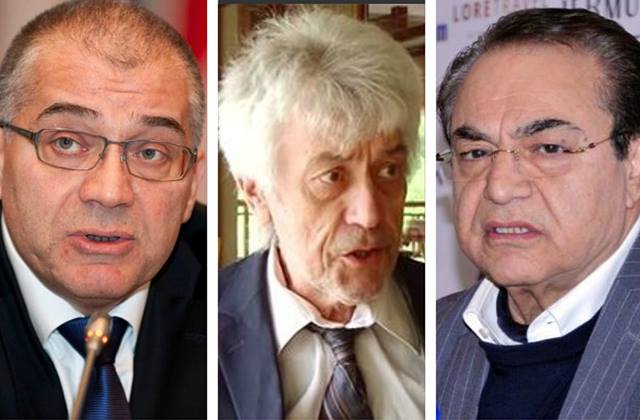How Realistic is Minsk Format Extension?

Azerbaijan is persistent in implementing changes to OSCE Minsk group three co-chair format. This time Azerbaijan’s authorities applied to Germany with a likewise proposal, which this year is a co-chair. Araz Azimov, former Minister of Foreign Affairs of Azerbaijan, recently stated that an offer was made to Germans to settle Nagorno-Karabakh conflict through OSCE Minsk group format.
Azimov also mentioned, “Application of complete format of Minsk group may become a means for extra pressure against Armenia by international community. I consider activity and role of, for instance, Germany, Sweden and Turkey in Minsk group more productive.” Azerbaijani diplomat reminded that last time Minsk group held plenary sessions in the period of 1995-96, after which whole negotiation process was limited within the United States, Russia and France.
“In 2012 at 20th anniversary of Minsk activity, Azerbaijan proposed to convene a Minsk conference (plenary) session. A range of states, from which—Turkey, unequivocally supported our proposal. Despite that, the initiative wasn’t brought into life,” Araz Azimov said, stressing that one of the obstacles in the settlement of NKR issue are disagreements between the co-chairs. According to the head of foreign policy office of Azerbaijan, it’s less probable that in near future war resumption will be recorded in Nagorno-Karabakh, as, first and foremost, it doesn’t comply with Russia’s interests.
“Russia doesn’t pursue any interest of war resumption in the region. Moscow has already been engaged with the war in Syria, and appearing of a new front isn’t in line with Russia’s interests. However, in case of war resumption Azerbaijan would wage it in its own territory, restore its territorial integrity and won’t invade into Armenian territory. Under these conditions Russia’s interference in defence for Armenia might not have a legal ground. In that case implementation of Collective Security Treaty provisions, repeatedly stated by Armenians, will simply be impossible and not right from legal standpoint,” Azimov said.
It’s worth noting that Ivica Dačić, OSCE Chairperson in Office, Serbian Foreign Minister and first Deputy Prime Minister, during the visits paid to Azerbaijan 2 years ago stated that Azerbaijan has some ideas on extension of Minsk group format. “However, it should be a consensus decision,” he said. At that phase Azerbaijan intended to supplement three co-chair format either by Turkey or Germany, which failed. Last year again discussions were held on convening a Minsk group conference. In March 2015 Minsk group co-chairs left for Minsk, where against the background of settlement of Nagorno-Karabakh conflict, the possibility of holding Minsk conference has been touched upon as well, which was risen by Minister of Foreign Affairs of Belarus.
However, essential disagreements between the conflicting parties around principles based on which the draft bill for comprehensive agreement should have been prepared, doesn’t allow changing any format or convening any concluding conference. Note, when Minsk group was initiated in 1992, holding of a concluding conference during final settlement of the conflict was planned. However, up to day not a single conference was succeeded to be held.
Uwe Halbach, German analyst, in an interview with 168.am memorized statement by German MFA Frank-Volter Steinmaier early this year, that Germany with its co-chairing intends to positively affect in peaceful settlement of NKR conflict.
“It’s not for the first time that Azerbaijan, Sweden and other interested parties offer making use of Minsk group complete format, and as German MFA mentioned, Germany will make use of all possibilities of OSCE to record a refraction in peaceful settlement of NK conflict, then this format may be one of the efforts directed towards issue settlement. It’s clear what expectations Azerbaijan has with this proposal, however, I don’t consider that currently even with this format convening of conference may record a refraction in negotiations, as main negotiators are the parties, then three co-chairs, and it’s not worth relying on Turkey and Germany. A lot has been talked of this, hasn’t it? However, since Germany became OSCE co-chair, it has never touched upon exact steps or initiatives on settlement,” Halbach said.
The latter mentioned that, to all probabilities, Germany will take into account all constructive proposals. However, German analyst instigated not to have great expectations from Germany, as the latter is currently interested only in NKR conflict zone on OSCE co-chairing. “Germany separately has always regarded the conflict as a zone of activity of OSCE Minsk group, in which it has nothing to do,” Halbach stated, mentioning that there is special attitude towards the conflict, on account of hazardous neighborhood and conflicts, which endanger already unresolved conflict. “German’s more cautious and attentive approach is conditioned by this,” Halbach said.
Dr. Zhirayr Kocharyan, professor at Free University of Berlin, in an interview with 168.am said that much isn’t known on new approaches of OSCE co-chairs, there are no new actions. “However, German’s pro-Turkish disposition is quite bothering. Currently both Germany and the European Union became more pro-Turkish, as they feel dependent from Turkey regarding migrants, which reminds of it in its pursued policy. We should beware of this,” Kocharyan said. In his conviction, however, Germany currently is more concentrated on European issues, rather than on the South Caucasus. “Simply the world has changed now, and everybody understands this, trying to pay extra attention to all existent issues,” Kocharyan said.
By Araks Martirosyan

























